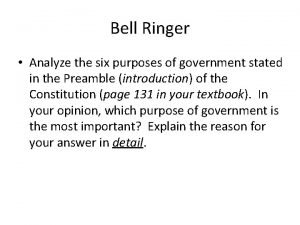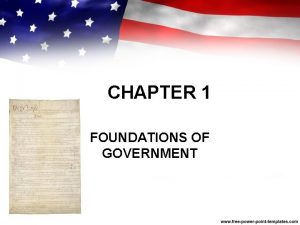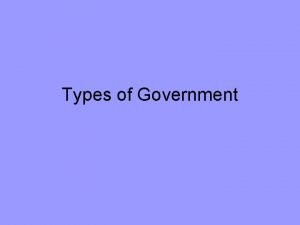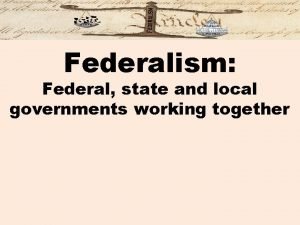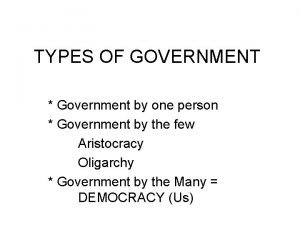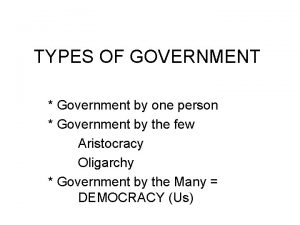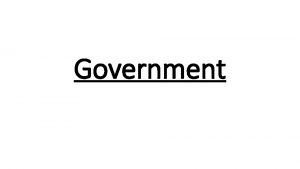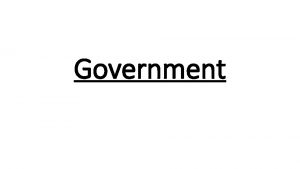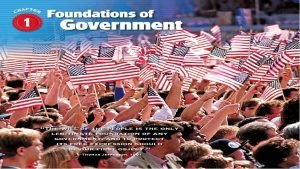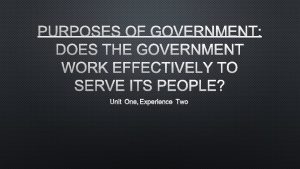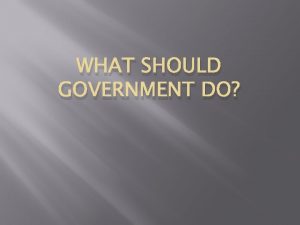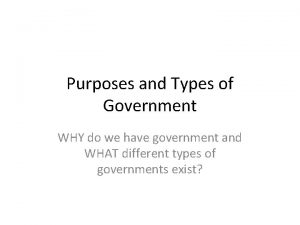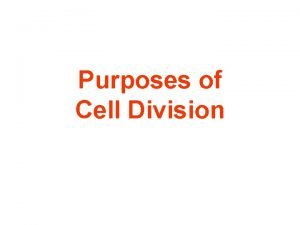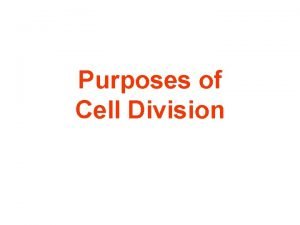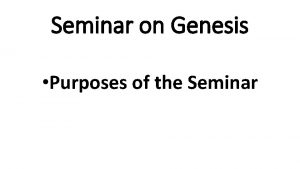Types of Government What are the purposes of
















- Slides: 16

Types of Government

What are the purposes of government?

Anarchy • Anarchy is a situation where there is no government. This can happen after a civil war in a country, when a government has been destroyed and rival groups are fighting to take its place. • Anarchists are people who believe that government is a bad thing. They say it stops people organizing their own lives.

Capitalist • In a capitalist or free-market country, people can own their own businesses and property. People can also buy services for private use, such as healthcare. • But most capitalist governments also provide their own education, health and welfare services.

Communist • In a communist country, the government owns things like businesses and farms. It provides its people's healthcare, education and welfare.

Democracy • In a democracy, the government is elected by the people. Everyone who is eligible to vote has a chance to have their say over who runs the country.

Dictatorship • This is a country ruled by a single leader. The leader has not been elected and may use force to keep control. • In a military dictatorship, the army is in control.

Federal government • In this type of system, a central government shares power with a number of small local governments. The USA is a type of this, called a federal republic.

Monarchy • A monarchy has a king or queen. In some traditional monarchies, the monarch has absolute power. • But a constitutional monarchy, like the UK, also has a democratic government that limits the monarch's control.

Regional or local • This is a government or council that controls a smaller area within a country. Some local governments have very limited powers and are mainly controlled by the central government. • Others are powerful enough to make their own laws, like individual states in the USA.

Republic • A republic is a country that has no monarch. The head of the country is usually an elected president.

Revolutionary Government • If a government is overthrown by force, the new ruling group is sometimes called a revolutionary government. • Coup – a sudden appropriation of leadership or power; a takeover

Totalitarian State • This is a country with only one political party. People are forced to do what the government tells them and may also be prevented from leaving the country.

Transitional Government • A country that is changing from one type of government to another has a transitional government. For example, a dictatorship may turn into a democracy after the dictator dies. • The change between governments can take several years.

The following types of government are categorized according to the answer to the question, “who rules? ” • • Aristocracy: a form of government in which the supreme power is vested in the principal persons of a state, or in a privileged order; an oligarchy Autocracy: government by a single person having unlimited power; despotism (domination through threat of punishment and violence) Bureaucracy: administration of a government chiefly through bureaus or departments staffed with non-elected officials Democracy: government by the people, exercised either directly or through elected representatives Gynecocracy: government by women Kakistocracy: government by the least qualified or most unprincipled citizens. Kleptocracy: a government characterized by rampant greed and corruption

• Meritocracy: a group of leaders or officeholders selected on the basis of individual ability or achievement • Monarchy: a government in which power is vested in a king, queen, emperor or empress who can pass power on to his heirs. • Monocracy: government or rule by a single person; autocracy • Oligarchy: a government in which a few people such as a dominant clan or clique have power • Plantocracy: a ruling class formed of plantation owners, leadership or government by this class of people • Plutocracy: a government or state in which the wealthy rule. • Stratocracy: government by the armed forces • Technocracy: a government or social system controlled by technicians, especially scientists and technical experts • Theocracy: a government ruled by or subject to religious authority
 Antigentest åre
Antigentest åre What are the 6 purposes of government
What are the 6 purposes of government Chapter 1 foundations of government worksheet answers
Chapter 1 foundations of government worksheet answers The purposes of government
The purposes of government What are the three levels of government
What are the three levels of government Hình ảnh bộ gõ cơ thể búng tay
Hình ảnh bộ gõ cơ thể búng tay Bổ thể
Bổ thể Tỉ lệ cơ thể trẻ em
Tỉ lệ cơ thể trẻ em Gấu đi như thế nào
Gấu đi như thế nào Tư thế worm breton là gì
Tư thế worm breton là gì Bài hát chúa yêu trần thế alleluia
Bài hát chúa yêu trần thế alleluia Kể tên các môn thể thao
Kể tên các môn thể thao Thế nào là hệ số cao nhất
Thế nào là hệ số cao nhất Các châu lục và đại dương trên thế giới
Các châu lục và đại dương trên thế giới Công thức tính độ biến thiên đông lượng
Công thức tính độ biến thiên đông lượng Trời xanh đây là của chúng ta thể thơ
Trời xanh đây là của chúng ta thể thơ

